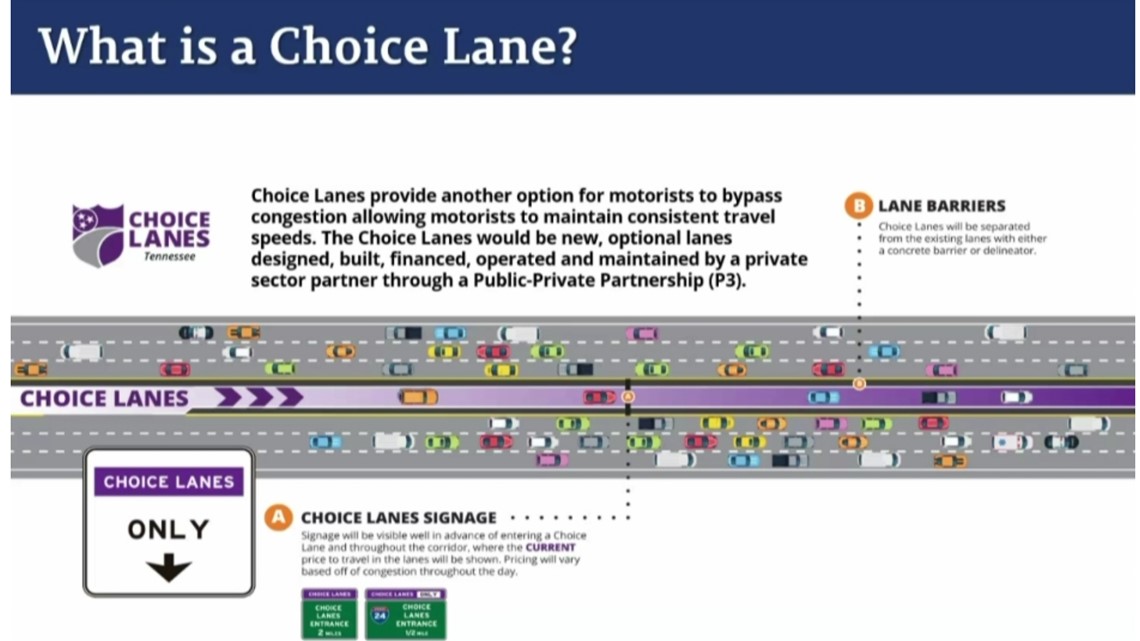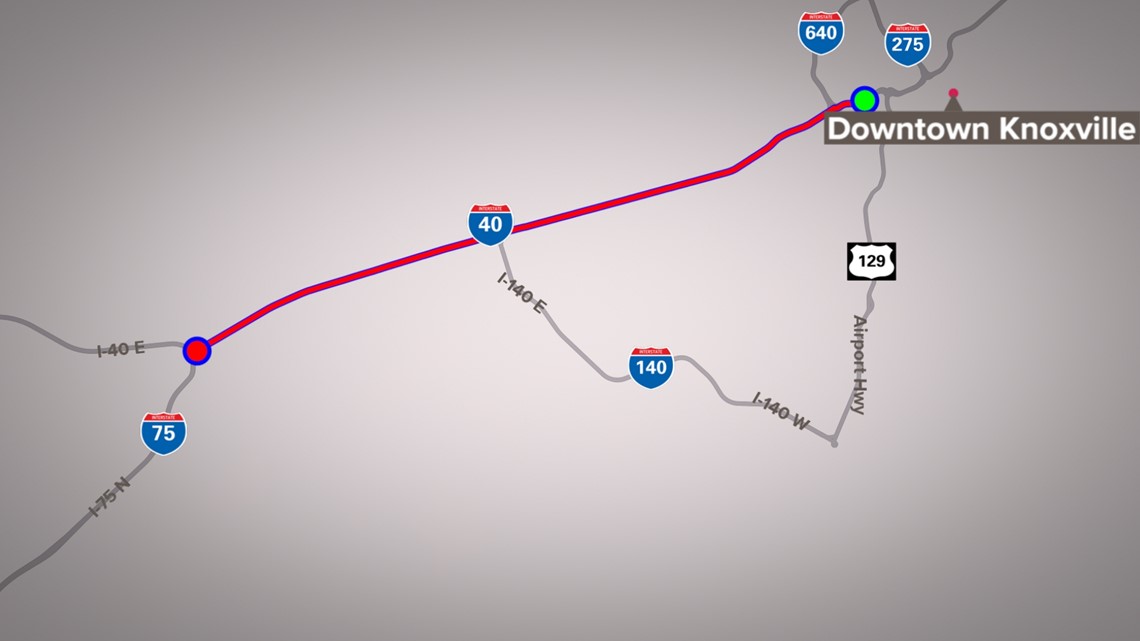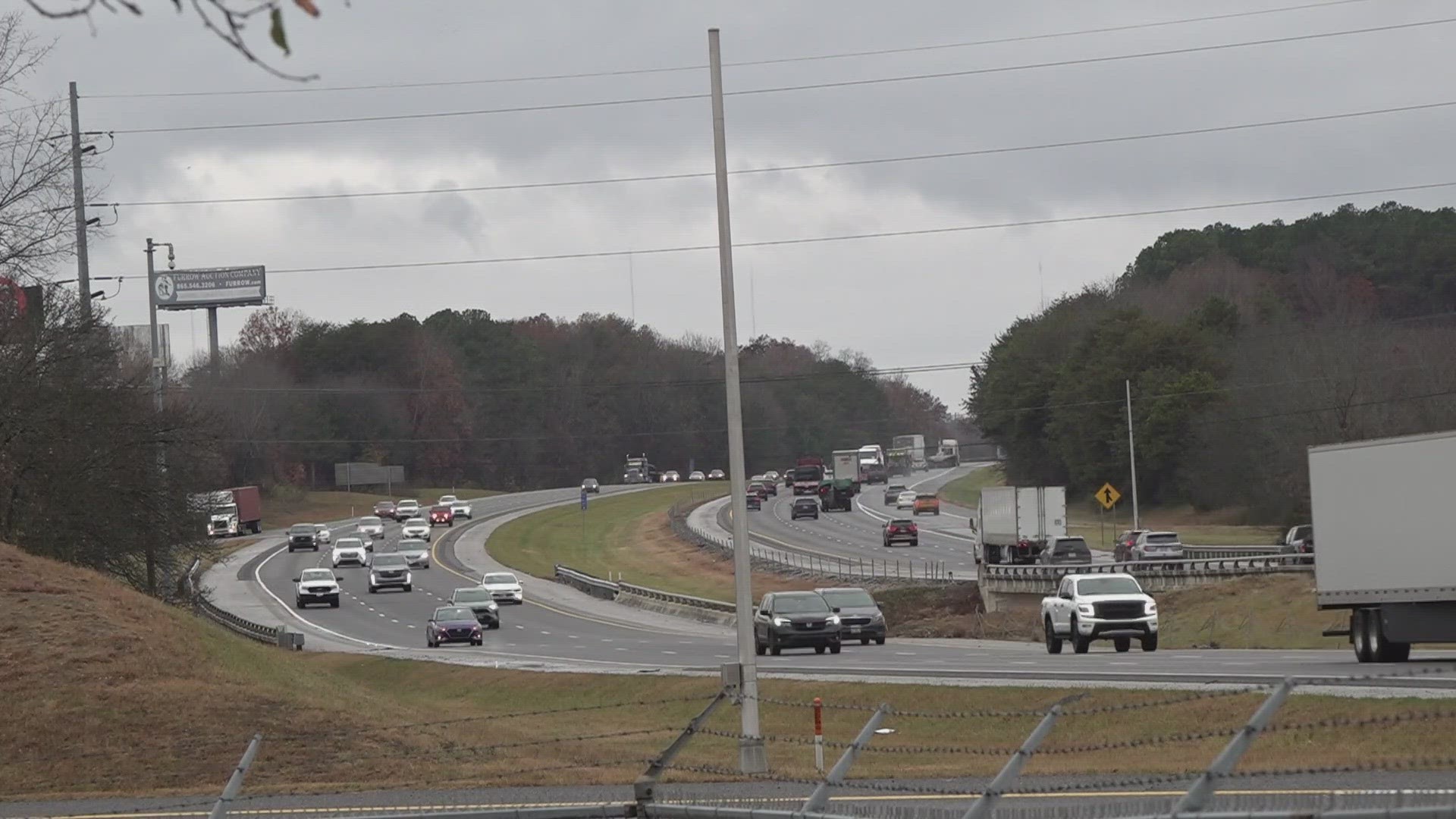KNOXVILLE, Tenn. — The Tennessee Department of Transportation unveiled new plans for the proposed 'Choice Lanes' program that would add a new pay-to-use traffic lane along the state's busiest interstate sections.
The project as currently proposed would be a public-private partnership and would first focus on Nashville -- adding a paid express lane to I-24 between Nashville and Murfreesboro. TDOT said it will be recommending the Nashville I-24 project to the Tennessee General Assembly and Transportation Modernization Board. The state is also considering adding one of these lanes to I-65 between Nashville and Spring Hill.
Other proposals for Choice Lanes in Knoxville and Chattanooga are still very much in the early proposal stages. The state is still trying to gauge and build interest from the private sector, and it said the current proposals are more of a general look at where Choice Lanes might help decongest traffic.
"An investor has to come in and say, 'Okay, I'm willing to invest $800 billion dollars into a Choice Lane project and they would design it, pay for it, build it, maintain it and operate it," said Sen. Becky Massey (R - Knoxville), the chair of the Senate's Transportation and Safety Committee.
Drivers would have to pay a rate to ride on those lanes.
Rep. John Ray Clemmons (D - Nashville), the House Democratic Caucus Chairman, said with inflation and a $7.25 per hour minimum wage in Tennessee, rates could limit some people and benefit others.
"You know, these rates can be set by the private companies who are operating these toll lanes," Clemmons said. "So, imagine you're a worker who maybe works in the hospitality industry in downtown Knoxville or downtown Nashville, downtown Nashville is a little worse. So, you're driving and you gotta get to work on time. So, now you're gonna pay, what, $15 to use the toll lane one way just to get to work on time? That's two hours of your minimum wage."
Massey said she had been looking at alternatives.
"Ultimately, the goal in all this is to leverage dollars and put Choice Lanes where they make sense, where they would pay for themselves, ultimately, through the user fee," Massey said. "As they're looking at the Choice Lanes projects in Knoxville, I've asked them to redo a new bypass study to see if that would alleviate our traffic."
Until Monday, TDOT had not detailed many plans on how or where the paid lanes would be incorporated on Tennessee's interstates.
TDOT said the state will partner with a private company to design, build, finance, operate and maintain a new lane on select sections of busy interstates. The state said this partnership would free up state funds to focus on other improvements in rural communities, such as widening projects.
The Choice Lane would be located in the center of the interstate and will be separated from the rest of traffic with concrete barriers or delineators. The lane would take drivers past specific corridors along the interstate that are known to be congested or frequently backed up.


In Knoxville, TDOT wants one of these lanes built in the West Knox County corridor of I-40 between where I-75 and I-40 connect between Loudon County and Downtown Knoxville. You can see the proposed area in the map below, but TDOT said it may not necessarily span the entire length if the project comes to fruition.
"The area where I-40 and I-75 are joined from the I-75 interchange to the SR 158 interchange is one of the most heavily traversed areas of Tennessee," TDOT said in its 10-year project plan. "By adding capacity to this heavily traveled roadway, operations are expected to improve in this major growth area."


TDOT estimated in its 10-year project plan that building a Choice Lane in Knoxville would require a "significant public contribution" after consulting with industry experts. It said it will move forward with traditional state-funded expansion projects if there isn't much interest on the private sector's side.
The state is also looking into having a lane built in Chattanooga along I-24, however, it said that lane would also likely require a "significant public contribution" to build at the moment. Currently, there isn't a precise timeline for these Choice Lane projects because the state is still conducting in-depth evaluations and consulting with the industry.
Typically, in busy metropolitan areas paid express lanes flow in one direction. Some are built on both sides of the interstate, and others are a single lane in the center that reverses directions at different points of the day to match the busiest flows of daily commuter traffic. In the morning, the lane might flow in one direction into the city and in the evening they change direction and flow out of the city. TDOT said it would work out which style of lane to use depending on how and where it's incorporated.
TDOT said pricing for these express lanes would change through the day depending on how many people are using it at any given time. The state likened it to airline tickets.
"The user fees will be advertised well in advance of using the lanes and once a driver enters the lane, they will be guaranteed to only pay the price they saw. User fee parameters and policies for any future Choice Lanes would be established by a statutorily created oversight authority. The private-sector partner/developer would set the user fee based on usage," TDOT said.
Clemmons said there's more work to be done.
"We need to be looking at modernized building, a modernized transportation infrastructure system that includes all alternatives," Clemmons said. "We're always going to have motor vehicles, but we also need to provide other options whether it's commuter rail, whether it's any other form of transportation."

